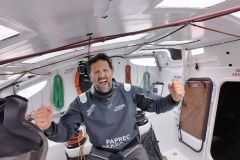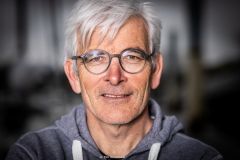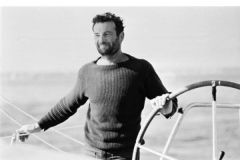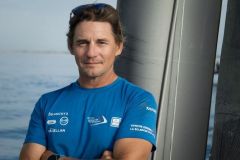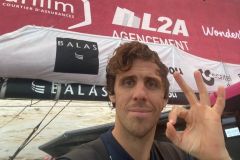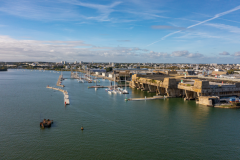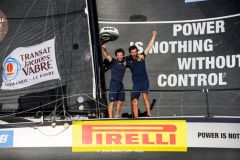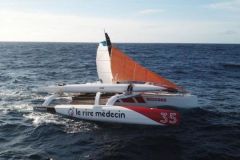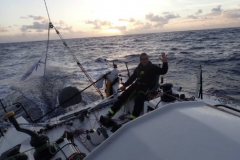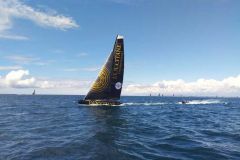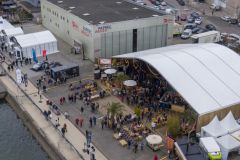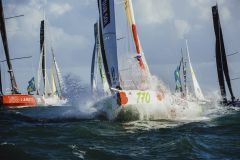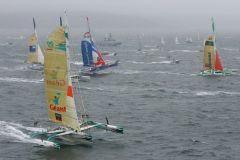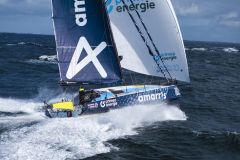Nicolas, can you introduce yourself to our readers?
Until a month ago, I was not a professional in the boating industry. I quit my job as a strategy consultant in Paris 3 weeks ago. For several years, I have been working on the nautical side of the business as well as my professional career. At the end of my studies, I participated in the Mini Transat in Proto in 2015. I was 23 years old and I finished 9th. I started my career in Paris, but after 6 months I realized that it was not going to work. I decided to do the Mini again, in series this time. I bought a Pogo 3 for the 2017 edition. I finished 2nd in the series and went on to the 2018/2019 season. I was so happy. I thought to myself " if I do this full time, I'm going to do something right." So I decided to start in Class40
With less than a month to go, what is your state of mind?
I am very happy with our preparation so far. We have made up for the lack of time with strong human resources. I have three préparateurs who have been working with me since the launch. I am in a positive frame of mind to take the start in good conditions.
We launched a week and a half ago. I can't wait to leave. For several months now, my project has been more about finding sponsors, answering emails... I'm finally going to be able to go sailing on my boat. I want to discover it, because for the moment, I have only seen 1% of it.
What are your ambitions for this Transat Jacques Vabre, with a boat recently launched?
On the sporting side, it's hard to position ourselves, knowing that this is the last Class40 to be launched. But we have every chance. Erwan ( Editor's note: Le Draoulec, his co-skipper ) is a fierce competitor too.
We would like to aim for victory, a podium, but the boat is not yet ready. She's not at her full potential. That will be more the case in the Route du Rhum. We're going to sail our own way. If we do our job well and the architects have done theirs, there's no reason for things to go wrong.
The Transat Jacques Vabre is very important, in the sense that next year I will have a transatlantic race in my hands before the Rhum. We really worked hard before the start to keep to the schedule.
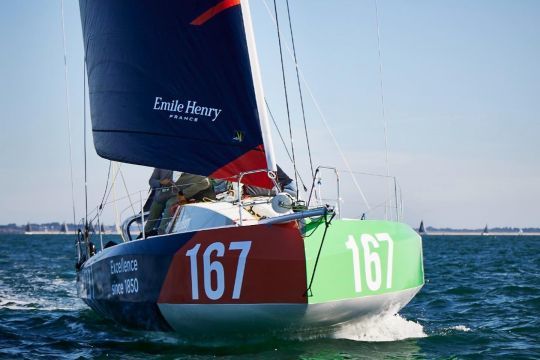
Can you tell us about your boat and your preparation? What are the results of your first sailings? Why did you choose VPLP and this type of Class40?
It is a VPLP/Multiplast plan. First of all, we choose a pair of architect and builder. There was a technological breakthrough in Class40 two years ago, with the appearance of the Crédit Mutuel and Banque du Léman scows.
Today, we are in the 2nd generation of scow. The architects have worked to improve the concepts even further: Lombard, Verdier and VPLP have proposed new models. The first scows cleared the way for the concept. It's a question of boat philosophy.
I first went to see Structures, Lombard. I wanted a boat for the open sea, for downwind VMG transatlantic races. A boat designed for big ocean races and not for racing between four buoys. I'm good at offshore racing, and bad at all races of less than 4 days. The longer I am at sea, the more comfortable I am.
The Clak40 is a plan that fits my desire to go wide. I had a Pogo in the Mini class, but I decided to look elsewhere. Multiplast is a legendary shipyard and VPLP is very well known. We had a very good feeling. It was also at a time in their project when I could still influence their design, especially on the ergonomics, which is what made the difference: 3 or 5 winches, 1 or 2 chutes ... The skipper can put the cursor where he wants.
I studied engineering and I am passionate about it. The Verdier plan was already ready to build, the plans were fixed.
It's very hard to make an assessment. We haven't sailed with other boats yet. The Jacques Vabre will be my first race. From a sensations point of view, the balance of the helm is a big issue in scow. The helm is a bit soft upwind. But this is not the case on my boat, the sensations are good. The ergonomics are great. The cockpit is great.
I returned from qualifying after 2 days at sea in rough conditions, with 25 knots. We are very well protected. The boat was going at 18 knots. It's very positive. Offshore, it's important to go fast without getting hurt. From a speed point of view, we had reference polars on the qualifier, we were within the limits. But it's impossible to say if the boat is doing well without comparison.
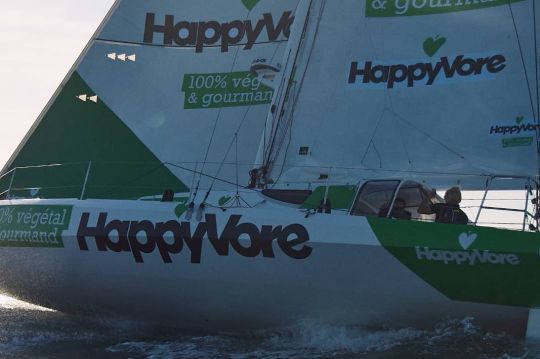
Can you tell us about your choice of Erwan Le Draoulec as co-skipper?
Erwan is above all a friend. We spent some vacations together this winter, while I was following the construction of my boat. He was really interested. Naturally, he told his sponsor Emile Henry about my project. The latter was interested in taking part in the adventure. Erwan was just as motivated.
I needed a co-skipper that I knew on a human level and who was also extremely competent. He finished in the top 10 in the Figaro, won the Mini... He is very mature. He's an exceptional sailor. So it was very natural, it ticked all the boxes. Emile Henry was motivated and brought the other half of the budget with my sponsor Happyvore. It's a perfect match.
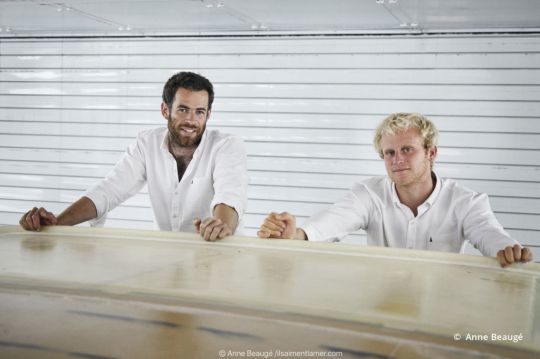
What are the constraints and advantages of a double-handed race format compared to solo racing?
It's radically different. Some people say that double-handed sailing has all the advantages of solo sailing, without the disadvantages. You can push the boat further, carry the spinnakers in more wind, sail with a bit more intensity, because there is always someone on deck.
For the first race of the boat, it is also easier to manage in case of technical problems. With two people, it's easier in case of pilot problems or to climb the mast.
There is also the human side. You have to manage your partner, as well as the boat. These are tough conditions. The boat goes fast, it hits. It's pretty tough offshore, especially the scows. These are boats that hit the sea, very uncomfortable boats. That adds to the adventure. We're going to have a lot of fun, we're going to laugh a lot. I love both formats. You have to do both and this first double-handed race is a jackpot.
What do you think of the new race courses? What will it change?
There is a bit of disappointment in the sense that I have never crossed the Equator. I grew up with the Mini where the competitors passed the equator, heading to Brazil. Then the course changed for my editions. And on this Jacques Vabre, we used to pass the Equator and it still changes. But it's good that races are renewed and that the course changes. The Covid also influenced this decision in spite of everything.
For my boat, which is optimized for VMG points of sail, with downwind tacking to gain on the wind, it's perfect. It's made for that. And it will be almost exclusively VMG on the second part of the course. So from a sporting point of view, it's better.
I'm glad. It's important to cross the oceans, the long trips. The destination is cool too, but just the fact of crossing the Atlantic, it counts. And we are always welcomed in the West Indies.
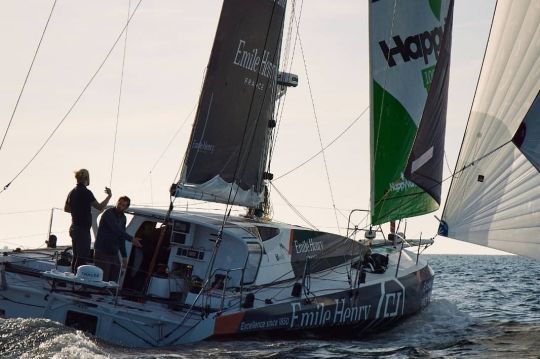
How do you feel about the competition, both in personal and material terms (boat)?
The field is strong. There are a lot of sailors with a lot of experience and who have already won a lot of races. It's exhilarating to race with sailors like that. We will learn a lot. It's great to race against people you had posters of in your room.
There are a lot of former minis, like Axel Trehin, Ian Lipinski, Luc Berry, Simon Koster, Valentin Gautier, Amélie Grassi, who I met on the Mini circuit and with whom I fought. It's cool to be on bigger boats. I'm not afraid. I'm discovering my boat and I also made podiums on the Mini circuit. I have less experience, but I will build it and my boat is competitive.
In any case, it's a good sign. It means the class is doing well. We have the excitement that all classes are looking for. The class is on a roll, the sponsors are there. We are able to attract partners and build projects.
After the Transat Jacques Vabre, what are your plans?
The adventure is to go to the Rhum 2022. Happyvore follows me until next year. That's my medium-term plan. I would like to do a great Route du Rhum with all the races of the Class40 circuit beforehand: Normandy Channel Race, Dhream Cup, Les Sables-Horta.
In the longer term, I would like to move on to bigger boats. The Vendée Globe type of round-the-world races make me dream. There are also Class40 races around the world. We have to see what's easiest to set up as a project. Knowing that it's always discussions with your sponsors.




